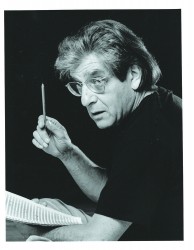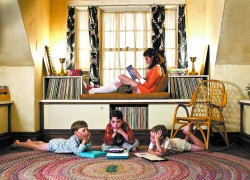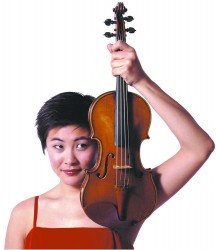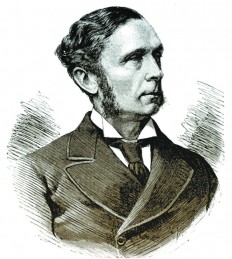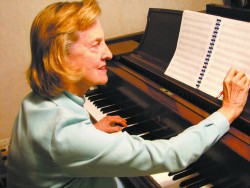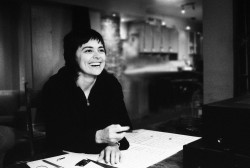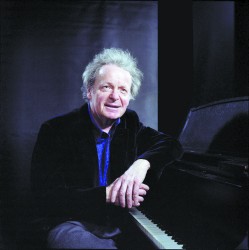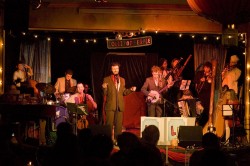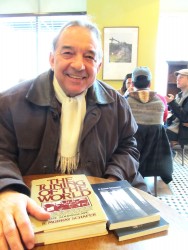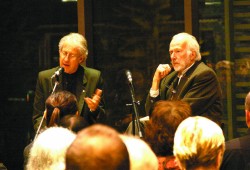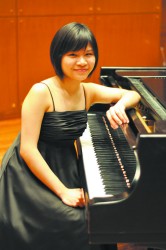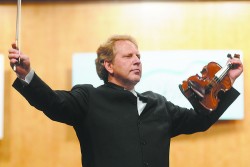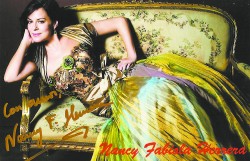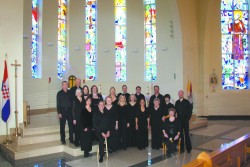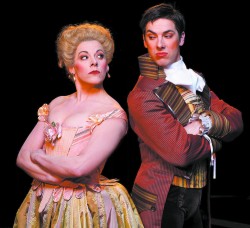On Singers and Their Teachers
As the latin epigram has it, Poeta nascitur, non fit: “a poet is born, not made.” Is that also true of singers? Up to a point, yes. When one hears outstanding artists like Karina Gauvin or Colin Ainsworth, one senses that there is an innate musicality which would simply have to come out. Yet a young raw talent will not be ready for a solo career, not even Ainsworth (who studied with Darryl Edwards) or Gauvin (who while still a teenager studied with Catherine Robbin, later with Marie Daveluy in Montreal and Pamela Bowden in Glasgow).
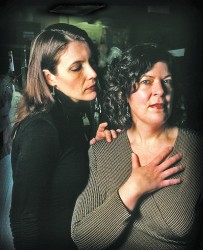 There are several institutions in Toronto and elsewhere in Ontario that offer training to young singers. In the Faculty of Music at the University of Toronto, Darryl Edwards is the head of voice studies and Lorna MacDonald holds the Lois Marshall chair. The university directory lists another ten voice instructors; they include a very senior figure in Mary Morrison along with well-known musicians such as Jean MacPhail and Nathalie Paulin. There are also teachers of diction and pianists who provide vocal coaching. One will be able to get a sense of what the university offers in the Tuesday performance classes for singers in the Edward Johnson Building on November 6, 20, 27 and December 4 at Walter Hall from 12:10pm to 1pm and also in the masterclasses with Edith Wiens in the Macmillan Theatre November 5 from 4pm to 6pm and Adrianne Pieczonka in Walter Hall (art songs November 14 at 7pm; operatic arias on November 15 at noon).
There are several institutions in Toronto and elsewhere in Ontario that offer training to young singers. In the Faculty of Music at the University of Toronto, Darryl Edwards is the head of voice studies and Lorna MacDonald holds the Lois Marshall chair. The university directory lists another ten voice instructors; they include a very senior figure in Mary Morrison along with well-known musicians such as Jean MacPhail and Nathalie Paulin. There are also teachers of diction and pianists who provide vocal coaching. One will be able to get a sense of what the university offers in the Tuesday performance classes for singers in the Edward Johnson Building on November 6, 20, 27 and December 4 at Walter Hall from 12:10pm to 1pm and also in the masterclasses with Edith Wiens in the Macmillan Theatre November 5 from 4pm to 6pm and Adrianne Pieczonka in Walter Hall (art songs November 14 at 7pm; operatic arias on November 15 at noon).
York University also has an extensive teaching program for singers. Catherine Robbin is the director of the classical voice studies program and other teachers include Stephanie Bogle, Norma Burrowes and Janet Obermeyer. On November 20 baritone Peter McGillivray will give a masterclass from 11:30am to 2:30pm and he will be followed by soprano Wendy Nielsen on November 23 from 11:30am to 4pm. Both events will be at the Tribute Communities Recital Hall, Accolade East Building.
Other strong music faculties in Ontario are those of Wilfrid Laurier University in Waterloo (Kimberley Barber, Leslie Fagan, Brandon Leis, Daniel Lichti) and the University of Western Ontario in London (Gwenlynn Little, Anita Krause, Frédérique Vézina and many others). In London there will be workshops for singers and vocal masterclasses on November 2, 9, 16, 23 and 30 in Talbot College, Room 100 at 1:30pm, a voice studio recital by Gloria Gassi on November 9 at 6pm and a masterclass with Adrianne Pieczonka on December 1 from noon to 2pm, both events in von Kuster Hall, UWO Music Building.
Not all singers go through a university degree in music. Isabel Bayrakdarian, who has a degree in engineering, studied with MacPhail, her first and only teacher. MacPhail has a very impressive teaching record: Wallis Giunta was another of her students and it was MacPhail who turned Giunta, an aspiring soprano, into a mezzo. She also taught Miriam Khalil and, among the most recent generation of singers, Erin Bardua, Beste Kalender, Sara Schabas and Taylor Strande.
A complaint I have heard from voice students is that academic programs are often so dominated by the requirements of the curriculum that there is not enough time for vocal technique or points of interpretation. Clearly there is a lot to be said for the sustained pupil-teacher relationship that Gauvin enjoyed with Robbin or Bayrakdarian with MacPhail. An alternative to study in a university program (or possibly a supplement) is offered by the Glenn Gould School at the Royal Conservatory. Here teachers include MacPhail (of course) and many other distinguished artists such as Ann Monoyios, Roxolana Roslak and Monica Whicher. Vocal coaching is provided by Rachel Andrist and Brahm Goldhamer. Some indication of the quality of advanced students will be given this month by an evening of opera on November 16 and 17 in Mazzoleni Concert Hall at 7:30pm. (Later this season there will be a concert of opera arias and songs on February 2 in Mazzoleni Concert Hall as well as the annual staged opera in Koerner Hall on March 20 and 22).
What happens after a music degree or a conservatory diploma? Toronto Summer Music and the Toronto Summer Opera Lyric Theatre and Research Centre offer further training as does the graduate diploma program offered by the Opera School at the University of Toronto. Some of the best young singers will be able to enter the Ensemble Studio of the Canadian Opera Company. The Aldeburgh Connection and Opera in Concert will always be looking for emerging talents; amateur choirs will need soloists. Yet the road towards a full-time professional career is not always easy, even for the most talented singers. One hopes that newly emerging singers will not have to go to Europe to have a career as has happened in the past with Lilian Sukis, James McLean and (until recently) Adrianne Pieczonka.
Some other events
On November 8 at 2pm Annamaria Eisler will perform a free concert of songs by Marlene Dietrich at the Toronto Public Library, 40 Orchard Blvd.
On November 16 artists of the U of T Faculty of Music with guest Adrianne Pieczonka, soprano, will present “An Evening of Song,” a free concert at 7:30pm in Walter Hall.
At the Glenn Gould Studio on November 18 Off Centre Music Salon presents “American Salon: Syncopated City – The Magic of New York,” with works by Sondheim, Gershwin, Bernstein and others, with soloists Sarah Halmarson and Ilana Zarankin, sopranos, and Vasil Garvanliev, baritone.
There will be a free concert at Walter Hall at 12:10pm on November 22. Lorna MacDonald soprano, with Susan Hoeppner, flute, Stephen Philcox, piano, and Peter Stoll, clarinet, will perform music by Gaveux, Roussel, Beckwith, Hoiby, Corigliano and Cook.
On November 25 at 2pm in Mazzoleni Concert Hall, Carla Huhtanen will be one of the soloists in a concert performance of Brian Current’s opera-oratorio Airline Icarus. (See cover story.)
Also on November 25 Danielle Dudycha, soprano, and Martin Dubé, piano, will perform works by Rachmaninoff, Poulenc, Dvorak, de Falla and Duparc at Gallery 345 at 8pm.
On November 28 John Holland, baritone, and William Shookhoff, piano, will perform works by Ravel, Donizetti, Dvorak, Mozart and others at 7:30pm in the Heliconian Hall.
On November 29 from 6pm to 8pm the Canadian Opera Company will hold its second Annual Ensemble Studio Competition in the Richard Bradshaw Amphitheatre.
The Messiah season will be upon us in December but the Elmer Iseler Singers are anticipating the annual flood by presenting their performance on November 30 in the Metropolitan United Church at 8pm. The soloists will be Leslie Fagan, Lynne McMurtry, Colin Ainsworth and Geoffrey Sirett.
In Walter Hall on December 2 at 2:30pm the Aldeburgh Connection will be giving its second concert of the season with “Madame Bizet: from Carmen to Proust.” The singers are Nathalie Paulin and Brett Polegato.
On December 2 Carolyn Hague, soprano, and Marie-Line Ross, piano, will perform songs from musical theatre and from the classical repertoire in the Heliconian Hall at 2pm.
On December 4 the Canadian Opera Company, in its free vocal series, will present arias and duets inspired by the Brothers Grimm in the Richard Bradshaw Amphitheatre at 12 noon.
On December 7 at 7:30pm Aurélie Cormier, soprano, and Bruno Cormier, baritone, will offer a free recital of French carols and other Christmas music at the Newman Centre.
And beyond the GTA
On November 8 at noon Patricia Green, mezzo-soprano, will be the soloist in a free program of love songs by Canadian composers in the Goldschmidt Room, 107 MacKinnon Building, University of Guelph.
On November 25 Monica Whicher, soprano, and Judy Loman, harp, will give a concert at Trinity United Church in Huntsville at 2pm.
Hans de Groot is a concert-goer and active listener, who also sings and plays the recorder. He can be contacted at artofsong@thewholenote.com.


